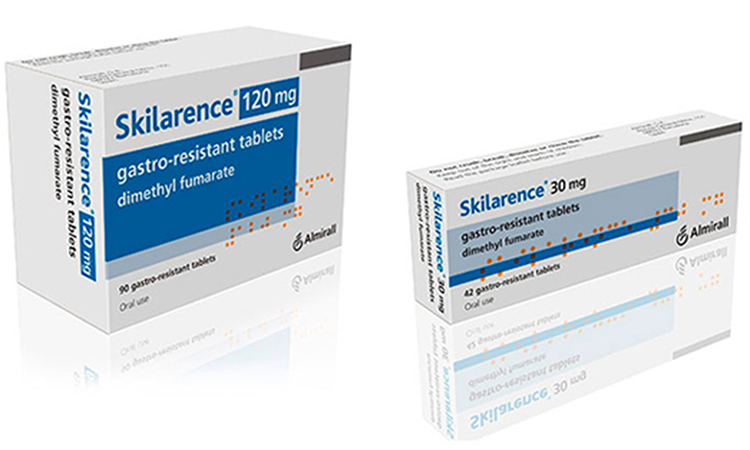Skilarence (dimethyl fumarate) vs Wezlana (ustekinumab-auub)
Skilarence (dimethyl fumarate) vs Wezlana (ustekinumab-auub)
Skilarence (dimethyl fumarate) is an oral medication primarily used for the treatment of moderate to severe plaque psoriasis, working by modulating the immune system to reduce inflammation. Wezlana (ustekinumab-auub), on the other hand, is a biologic injectable medication that targets specific proteins in the immune system, interleukin-12 and interleukin-23, and is used to treat moderate to severe plaque psoriasis, psoriatic arthritis, and Crohn's disease. When deciding between the two, patients should consider factors such as the severity of their condition, route of administration preference, potential side effects, and any pre-existing health conditions that may affect treatment efficacy or safety.
Difference between Skilarence and Wezlana
| Metric | Skilarence (dimethyl fumarate) | Wezlana (ustekinumab-auub) |
|---|---|---|
| Generic name | Dimethyl fumarate | Ustekinumab |
| Indications | Psoriasis, Multiple Sclerosis | Plaque Psoriasis, Psoriatic Arthritis, Crohn's Disease, Ulcerative Colitis |
| Mechanism of action | Activates the Nrf2 pathway, which protects cells from oxidative stress | Targets interleukin-12 and interleukin-23 to modulate the immune response |
| Brand names | Skilarence, Tecfidera | Wezlana, Stelara |
| Administrative route | Oral | Subcutaneous, Intravenous |
| Side effects | Flushing, gastrointestinal issues, lymphopenia | Upper respiratory infections, headache, fatigue, injection site reactions |
| Contraindications | Known hypersensitivity to dimethyl fumarate or its excipients | Known hypersensitivity to ustekinumab or its excipients |
| Drug class | Fumaric acid ester | Monoclonal antibody |
| Manufacturer | Almirall, Biogen | Janssen Biotech |
Efficacy
Efficacy of Skilarence (Dimethyl Fumarate) in Psoriasis
Skilarence, containing the active ingredient dimethyl fumarate, is an oral medication approved for the treatment of moderate to severe plaque psoriasis. Psoriasis is a chronic, immune-mediated skin condition characterized by red, scaly patches. Clinical trials have demonstrated that Skilarence can significantly reduce the severity of skin lesions and improve the quality of life for patients with psoriasis. The drug's efficacy is measured by the Psoriasis Area and Severity Index (PASI) score, which assesses the extent and severity of psoriasis. In pivotal studies, a significant number of patients treated with Skilarence achieved a 75% reduction in PASI score (PASI 75) compared to placebo, indicating a substantial improvement in their skin condition.
Efficacy of Wezlana (Ustekinumab-auub) in Psoriasis
Wezlana, with the active substance ustekinumab-auub, is a biologic medication administered via subcutaneous injection and is indicated for the treatment of moderate to severe plaque psoriasis. Ustekinumab targets interleukin-12 and interleukin-23, cytokines involved in the inflammatory processes of psoriasis. The efficacy of Wezlana has been established through extensive clinical trials. Patients receiving Wezlana have shown a significant improvement in their PASI scores, with many achieving PASI 75, PASI 90, and even PASI 100, which represents complete clearance of psoriatic lesions. The response to Wezlana is typically rapid, with patients often observing improvements within the first few weeks of treatment.
Comparison of Efficacy in Psoriasis Treatment
When comparing Skilarence and Wezlana, both medications have demonstrated efficacy in the treatment of psoriasis, albeit through different mechanisms of action. Skilarence, as an oral treatment, may be preferred by patients who are averse to injections. However, Wezlana, as a biologic, may be more suitable for patients with more severe disease or those who have not responded adequately to traditional systemic therapies. The choice between these medications should be individualized, taking into account the patient's medical history, the severity of psoriasis, and the presence of comorbidities.
Considerations and Conclusion
In conclusion, both Skilarence and Wezlana have been shown to be effective treatments for moderate to severe plaque psoriasis. The efficacy of these medications has been validated in clinical trials, which have highlighted their potential to significantly reduce the burden of psoriasis on patients. It is important for healthcare providers to consider the individual needs and preferences of patients, as well as the safety profiles and potential side effects of these medications, when recommending a treatment plan for psoriasis.
Regulatory Agency Approvals
Skilarence
-
European Medical Agency (EMA), European Union

Wezlana
-
Food and Drug Administration (FDA), USA

Access Skilarence or Wezlana today
If Skilarence or Wezlana are not approved or available in your country (e.g. due to supply issues), you can access them via Everyone.org.
How it works

Make an enquiry
Choose the medicine you want to buy, answer a couple of questions, and upload your prescription to speed things up. We’ll get back to you within 24 hours.


Make an enquiry
Choose the medicine you want to buy, answer a couple of questions, and upload your prescription to speed things up. We’ll get back to you within 24 hours.


Breeze through the paperwork
We'll guide you through the required documents for importing unapproved medicine, ensuring you have all the necessary information.


Get a personalized quote
We’ll prepare a quote for you, including medicine costs and any shipping, administrative, or import fees that may apply.


Receive your medicine
Accept the quote and we’ll handle the rest - sourcing and safely delivering your medicine.

Some text on this page has been automatically generated. Speak to your physician before you start a new treatment or medication.
Let's talk
If you have any questions, call us or send us a message through WhatsApp or email:
Contact us




